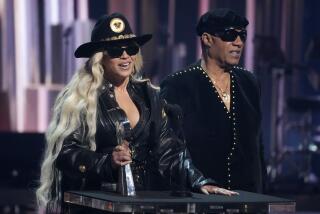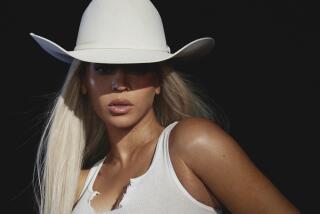Béla Fleck, Abigail Washburn combine much more than dueling banjos
Béla Fleck and Abigail Washburn, two banjo players equally respected in the different corners of the Americana music world, got married in 2010 and last year became first-time parents with the arrival of their son, Juno.
Suddenly they were faced with the conundrum many new parents face: balancing careers and family life. What’s a couple to do?
The result? “Bela Fleck & Abigail Washburn,” an album of songs featuring two banjos, Washburn’s lead vocals and, occasionally, Fleck’s voice as well. They’re also taking to the road with a tour that reaches Los Angeles this week for a stop at the recently revitalized Regent Theatre downtown on Saturday.
“There’s a lot of layers to it,” Washburn said in a speakerphone conversation with Fleck from their home in Nashville, where the album was recorded in a basement studio largely between sessions when she was nursing Juno. “Fitting the two banjos together might have been the easier part. ‘Exciting’ and ‘daunting’ would both be words that would accurately describe making this record. Finding ways to actually get it made might have been the most challenging part.”
Added Fleck: “It’s fun — we enjoy the puzzle-solving aspect of working on music together.”
The challenge of making a record that didn’t constantly turn into “Dueling Banjos” turned into an opportunity to fully explore the family of instruments.
Fleck and Washburn employed seven instruments, from a tiny ukulele banjo to the standard five-string versions both usually play up to larger baritone and bass banjos, creating an orchestral-like dimension to the songs.
They also incorporated unusual tunings and playing styles, such as the slip-sliding technique Washburn employs with a fretless banjo for the song “Little Birdie.” One of the guiding principles is that they wouldn’t record anything they couldn’t reproduce live, so there was no overdubbing of additional vocals or instruments. The album’s credits whimsically note, “No banjos were harmed in the making of this record.”
“Using a variety of banjos seemed to be the key to how to make this not be a train wreck,” said Fleck, who has collected 13 Grammy Awards over the last 20 years, not just for instrumental performance but in jazz, world music, pop, classical crossover and composition categories.
Reduced instrumentation and available time, Washburn said, turned out to be allies, not enemies.
“Limitations can be really helpful,” Washburn said. “Everyone’s got them, but in our case, I don’t think we were thinking of limitations, we were thinking what would be really good to do together. There were certain things we were interested in exploring to see what we could add.”
The album opens with “Railroad,” a minor-key marriage of the 19th century folk song “I’ve Been Working on the Railroad” and Stephen Foster’s “Oh! Susanna,” an arrangement that starts with a repetitive riff echoing the feeling of a locomotive chugging down the tracks.
Not coincidentally, both songs have lyrical references to banjos.
“The way it came up,” Fleck said, “is that Abby was teaching Juno how to bang on things. She was banging things together and she started singing [‘I’ve Been Working on the Railroad’] out of the blue. She called to tell me — I was on tour, and we were FaceTiming — and when I heard them both banging on stuff with her singing that song, I thought, ‘That’s really cool.’ I told her, ‘When we get home, we should mess with that.’”
They also messed with “New South Africa,” a song Fleck originally recorded with his long-running band, the Flecktones, almost two decades ago. The track was inspired by the group’s visit to South Africa shortly after Nelson Mandela was elected president.
“Abby and I had been talking about playing together, so even before working on this record, we decided to work one of my songs up,” Fleck said. “This one seemed like it could be a good beat with the two banjos.”
As usual for the genre-hopping Fleck, the album reaches far afield of conventional source material. He adapted some piano pieces written for children by his namesake, Hungarian composer Béla Bartok, into a track titled “For Children — No. 3 Quasi Adagio, No. 10 Allegro molto — Children’s Dance.”
“I thought some of these very simple children’s piano pieces would make cool banjo arrangements,” Fleck said, with Washburn adding: “It became a wonderful education about what beautiful composition can do with some very simple melodic information.”
Other songs explore questions of mortality (“And Am I Born to Die,” “What Are They Doing in Heaven Today?”) while the aptly titled “Banjo Banjo” revels in the instruments’ melodic and sonic riches through a musical dialogue between Washburn and Fleck.
“This project has been so satisfying,” Fleck said. “It’s gotten a lot more attention than we might have thought, we’ve toured to a lot of places, and it’s been such a warm experience to go out and play with Abby.
“We’re just a banjo-centric couple on the road with a baby,” he added. “It’s way more fun than I could ever have imagined.”
Twitter: @RandyLewis2
--------------------------------
Where: Regent Theatre, 448 S. Main St., Los Angeles
When: 8 p.m. Saturday
Cost: $33 to $43
Info: https://www.ticketfly.com
More to Read
The biggest entertainment stories
Get our big stories about Hollywood, film, television, music, arts, culture and more right in your inbox as soon as they publish.
You may occasionally receive promotional content from the Los Angeles Times.







